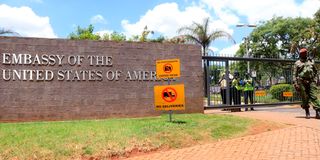Kenya's ex-UN envoy rebukes US comment Nairobi agreed with

US Embassy in Nairobi.
Kenya's former permanent representative to the UN has criticised a US government "lecture" on governance issues in his home country, even though Nairobi agreed with it.
The issue concerns the ongoing vetting of cabinet secretary nominees in Kenya who are alleged to have integrity issues.
The US Embassy had on Thursday August 1 urged Kenyan MPs to reject those with past integrity issues, following protests that forced President William Ruto to sack his entire ministerial team.
“As Kenyans look ahead to the vetting of Cabinet nominees beginning today, we recognise the importance of integrity in public service and the National Assembly’s vital role in upholding Chapter Six of Kenya’s Constitution,” the Embassy said on August 1 without naming names.
But Martin Kimani, Kenya's permanent representative to the UN in New York until April this year, saw the US commentary as a lecture that Kenya didn't need.
Rather, he saw it as a distraction from Washington's own global failures, including the ongoing war in Gaza, where a ceasefire has proved elusive.
“Since my former @ForeignOfficeKE (Ministry of Foreign Affairs) colleagues are restrained by their diplomatic sensibilities, I will respond to this grating lecture from a US experiencing political violence, plummeting trust in its electoral institutions, and an uncertain transfer of power,” Dr Kimani, now working for a think-tank in New York, wrote on X.
“Lecture less, renew US democracy, and deliver a ceasefire in Gaza.”
On Friday August 2, Kenya said it wouldn't respond directly to the US embassy's comments, although it agreed with the call to prioritise integrity issues.
"The statement (by the US Embassy) expresses a view that aligns with that of many Kenyans and is consistent with our Constitution,” said Dr Korir Sing’oei, Kenya’s Principal Secretary for Foreign Affairs.
“We take no serious issue with it,” he told The EastAfrican.
The dissolution of the cabinet was initially the result of intense pressure from Gen-Z protesters in Nairobi, who first forced the government to withdraw a controversial finance bill.
The US government initially refrained from intervening in the protests, before warning Nairobi not to use excessive force against protesters and to respect civil liberties.
The new team of cabinet nominees includes a number of opposition politicians, some of whom have been hauled before the courts to answer questions about the misappropriation of funds.
But the US administration itself was in an awkward position when the protests began in June, with some critics arguing that it had looked the other way as Nairobi prepared a controversial package of tax laws.
A few days after the nationwide protests began, Washington also designated Kenya a major non-NATO ally, which would normally give Nairobi access to some military technology from Washington, for a price.
Since then, however, Western diplomats have walked a fine line, speaking up for civil liberties while being careful not to damage developing relations with the government of President William Ruto.
Ruto made a state visit to Washington in May, the first African leader to do so since 2008.





